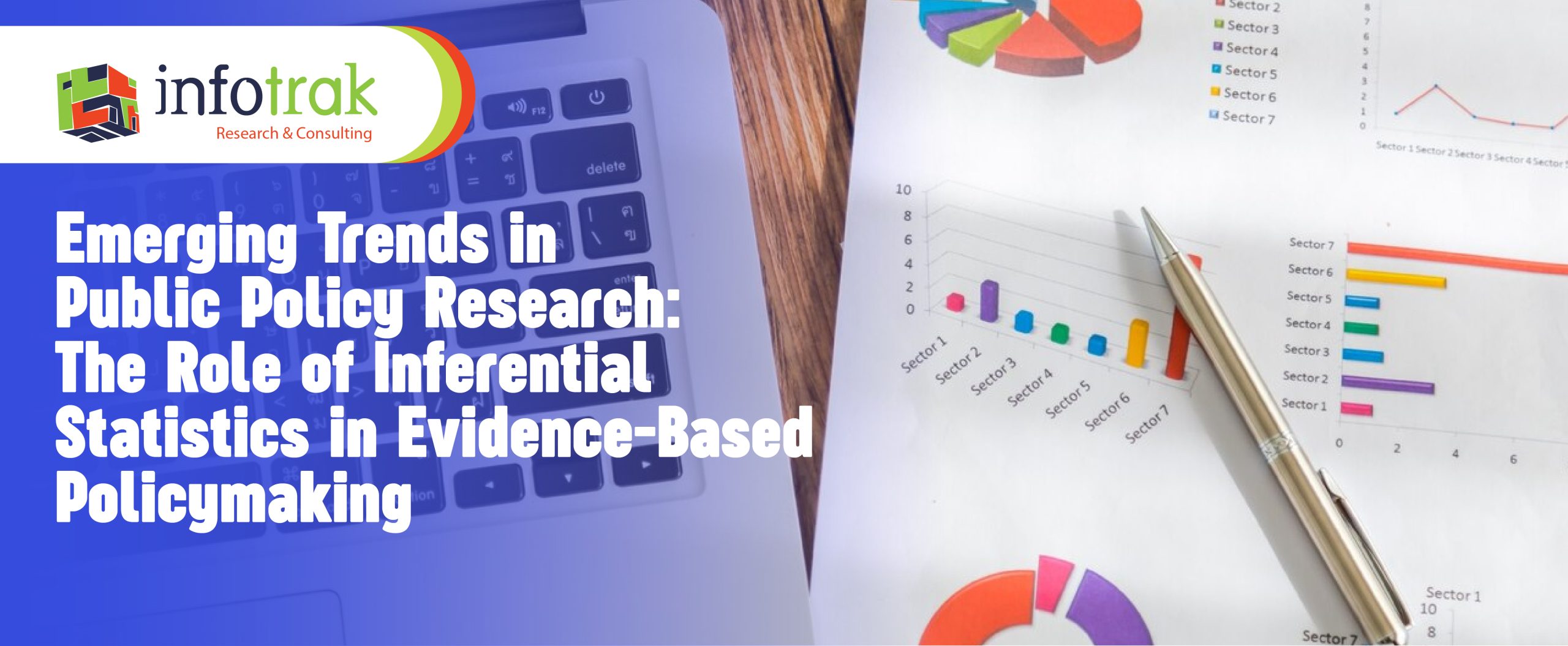Emerging Trends in Public Policy Research: The Role of Inferential Statistics in Evidence-Based Policymaking
By Samson Omondi.
Public Policy Researcher at Infotrak Research and Consulting.
Date 28th May 2024.
Evidence-based policy making involves using rigorous data and research to inform policy decisions. Our clients in this category aim to improve the quality of policy choices and enhance policy implementation [4]. Inferential statistics play a crucial role in this process by allowing these clients to draw meaningful conclusions from data and make informed decisions.
Reasons why we embed Inferential Statistics in analysis and reporting plan.
Generalization. Inferential statistics enable us to generalize findings from a sample to a larger population. Policymakers often deal with limited resources, so understanding population-level effects is essential. By analysing a representative sample, we can infer how policies might impact the entire population [1][2][3].
Causality. Policymakers need to determine cause-and-effect relationships. Inferential statistics help establish causality by assessing the strength and significance of associations between variables. For example, they can determine whether a policy intervention caused a specific outcome.
Hypothesis Testing: Policymakers formulate hypotheses about the effects of policies. Inferential statistics allow us to test these hypotheses rigorously. By comparing observed data to expected patterns, we assess whether differences are statistically significant.
Predictive Modelling: Policymakers often need to predict future outcomes. Inferential techniques, such as regression analysis, help build predictive models based on historical data. These models inform policy decisions by estimating the likely impact of different interventions.
Top Reasons for applicability of inferential statistics in policy making
- Impact Evaluation: Inferential statistics are crucial for evaluating policy effectiveness. Randomized controlled trials (RCTs) and quasi-experimental designs use inferential techniques to assess whether a policy caused the observed changes when evaluating a project. For instance, assessing the impact of an educational program on student performance.
- Survey Analysis: Policymakers collect data through surveys to understand public opinions, preferences, and behaviors. Inferential statistics analyse survey responses, providing insights into citizen needs and preferences. This informs policy design and implementation.
- Economic Impact Assessment: Inferential methods help estimate the economic impact of policies. For example, assessing tax exemptions or trade policies requires analysing data to understand their effects on economic indicators.
- Policy Simulation: Inferential statistics allow policymakers to simulate different scenarios. By modelling potential policy outcomes, they can make informed choices. For instance, simulating the impact of healthcare reforms on health outcomes and costs.
Inferential statistics bridge the gap between data and evidence-based policymaking [3]. It is against this backdrop that Policymakers must collaborate with entities that offer customised policy research products like us, Infotrak Research and Consulting; department of Public Policy and Governance with reputable team of statisticians and experienced researchers to ensure robust study formulation, analyses and reporting. By embracing inferential techniques, we enhance policy decisions and contribute to better governance worldwide.
References
[1] EFFECTIVE USE OF STATISTICS IN EVIDENCE-BASED POLICYMAKING.
https://www.unescwa.org/sites/www.unescwa.org/files/publications/files/e_escwa_sd_13_tp-1_e.pdf.
[2] Effective use of statistics in evidence-based policymaking - conceptual
https://archive.unescwa.org/publications/effective-use-statistics-evidence-based-policymaking-conceptual-framework.
[3] Statistics for Public Policy - The University of Chicago Press.
https://press.uchicago.edu/ucp/books/book/chicago/S/bo208513258.html.
[4] Statistics and Public Policy | SpringerLink.
https://link.springer.com/chapter/10.1007/978-3-030-53085-3_3.
Samson Omondi
Samson is an accomplished data analyst and research consultant with a strong foundation in Applied Statistics. He earned his degree in Applied Statistics from Kenyatta University, where he honed his analytical skills and developed a passion for data-driven decision-making.Currently serving as the Head of the Public Policy and Governance Department at Infotrak Research and Consulting, Samson brings a wealth of knowledge and innovation to research. His commitment to free information dissemination and capacity building is evident in his work, where he consistently strives to empower others through data literacy and evidence-based practices.Samson’s proactive approach to both work and life reflects his dedication to continuous learning and growth. Whether analyzing complex datasets or shaping policy recommendations, he remains steadfast in his pursuit of excellence.



